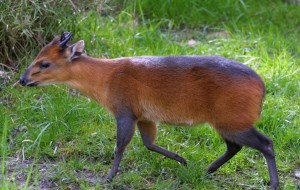
Bay Duiker, scientific name, Cephalophus dorsalis, as a member of the Cephalophinae family, is a ruminant under the cattle group. This species, found in the southeastern-most part of Nigeria is a duiker, a family of antelopes having a compact body, relatively short legs, and strong hindquarters. The name, ducker, the Afrikaans for “diver” had been earned from the short bursts of speed through dense vegetation by which they usually escape predators. Duikers are distinguished by having arched backs, skulking habits and tufts of hair between the ears. Duikers are a species rich subfamily of threatened African antelope whose recent origin poses a challenge to the molecular identification of taxa and estimation of their phylogeny. The Bay duiker, for example, had been put forward in a weakly supported mitochondrial lineage grouping as a giant duiker, alongside C. silvicultor, C. spadix, and C. jentinki.
Bay duikers are nocturnal animals that shelter during the day in dense vegetation, in hollow trees or under fallen trunks. They are essentially frugivorous but birds are also eaten. Gestation takes about 240 days and the calf, once born, reaches sexual maturity at 18 months and may live for up to 17 years in captivity. This shy African antelope species, called Etu in Yoruba, even has a oríkì or panegyric but that does not protect it against the bushmeat trade by which it is most seriously threatened.
